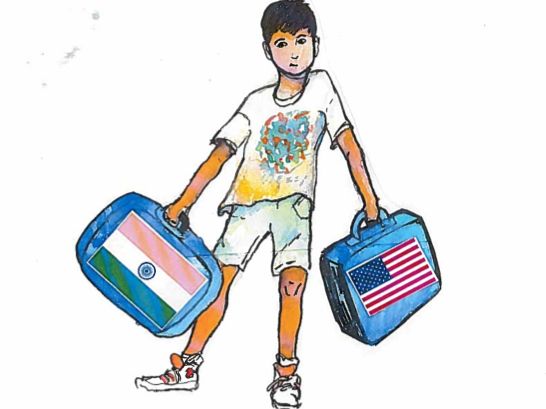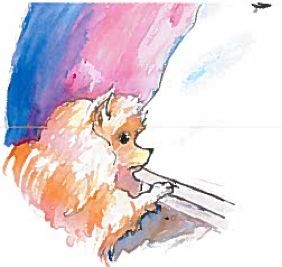 Pittsburgh, Pennsylvania. 1993. 6th grade. Mr. Baladucci’s Spelling class.
Pittsburgh, Pennsylvania. 1993. 6th grade. Mr. Baladucci’s Spelling class.
A skinny Indian boy slouches in the back of the class. That’s me. Tongue out, eyebrows furrowed, meticulously erasing the letter “e” in “resteurant.” I was born in Cleveland, but had spent my entire childhood in this town. Aside from the standard travails of being an immigrant family in a mid-western American suburb, my childhood was good.
Everyone passed their tests to the front and Mr. B collected the papers. He began his lesson for the day.
I sauntered to the front of the class and quietly placed my test atop the paper pile.
“Can’t take that, Ashish-O. It’s late.”
“It’s, like, ten seconds late.”
“No can do, buddy.”
Though punkish, I was a good student. Years later I would experience the letters B, C, D and F, but back then anything lower than an A was unthinkable.
Enraged, I grabbed my test, crumpled it and threw it at Mr. B. The paper bounced off his middle-aged paunch and fell softly at his feet. His face turned as red as the stripes on the crisp American flag behind him. He pointed angrily at me, and then at the door.
“Out in the hall, Ashish-O! You’re in a heap!” he roared.
I had raised the ire of the angry, Italian spelling teacher. I was scared, but these moments provided tremendous cred in 6th grade. I strutted out into the hallway.
Mr. B stormed out behind me and slammed the classroom door. He grabbed me by the shirt and put his face inches away from mine.
“Is that how you act at home, you little shit?”
It wasn’t the first time a teacher or principal had threatened me with physical harm. It’s why children are so vulnerable — how can you know when boundaries are being crossed when you don’t know what the boundaries are?
“No,” I whispered and looked away.
He let go of my shirt and stood up straight.
“Then don’t do it here,” he hissed through clenched teeth.
He gave me the first of the many detentions I would have in my scholastic career. I had earned it.
When I reentered, the class “oooooooohed.”
The pretty girl smiled at me. The cool kid turned around and slapped me five. “Yea, Ashish-O.”
Mr. B was still cooling down. He asked the new foreign exchange student, Livia, to read from the next lesson. The easiest way to keep my roll going was to make fun of the immigrant kid.
“Leevia Popeescia, the skeeeeza from Romaniaaaa!” I rapped.
The class laughed. Livia blinked rapidly and looked down, humiliated.
“You’re pushing it, buddy,” Mr. B seethed. “One more peep, and YOU’RE OUTTA HERE!”
Everyone grew silent. I looked down, glancing at Livia from the corner of my eye. I wanted her to be in on the joke I just made at her expense. She wasn’t.
* * *

Not too long after, my family moved to New Jersey. The move shook me. The neighborhood I grew up in. The friends I knew from the beginning of memory. The old, white woman at the deli who called me “tough cookie” and had knitted me a collection of stuffed animals. The pothole full of tar that I accidently ruined my new sneakers in while walking home. The small pond I dug into our gravel driveway that would fill with frogs on spring mornings.
Soon after that, my family moved again. This time it was to India.
* * *
8th Grade English. 1994. Modern School. Lucknow, India.
The assignment was to memorize the poem “Tiger, Tiger,” by William Blake and recite it in front of the class.
My father taught at a university nearby and every evening we sat down for a nice, quiet family dinner at the campus cafeteria. Afterwards, I shouted, screamed and made meticulous lists of reasons for us to go back to America. In 1994, India was still a legitimate 3rd world country, and back then I was only interested in visiting every few summers. Though I loved the country, living there was no sort of an option for the young me, as I rather enjoyed carpeting, hot showers and pizza that wasn’t made from ketchup and imported Cheez-Wiz.

In an attempt to appease my discontent, my parents bought me the dog I had wanted all my life. I’ll never forget the little Pomeranian puppy darting around the house that first evening. Chasing tennis balls, learning how to use the stairs and peeing on my brother’s lap.
I stood in front of the class in a full uniform. My first day of school, I had worn a risqué Pearl Jam shirt and green jean shorts. By now, though, I had been fully acculturated. My uniform was a crisp, invigorating gray and white. The knot of my clip-on tie dug into my neck and I was still lightheaded from the shoe polish fumes that morning.
“Tiger, tiger, burning bright
in the forests of the night,
what immortal hand or eye
could frame thy fearful symmetry?”
The class laughed.
“Array, boltha kaisa hai! (He talks so strangely)” whispered a girl in pigtails.
“Tie-GER, Tie-GER, BURNing BRIGHT!” said a boy towards the back, speaking in an overly exaggerated American accent.
The class laughed again and the teacher shouted for quiet. I was embarrassed. Like any kid, I was self-conscious. But my manner of speaking English had never been amongst my insecurities.
That evening, I spent hours in front of the mirror practicing an Indian accent and adopting the tonalities of my father. The same accent mocked in ’90s American pop culture would now serve as my armor against alienation.
But the armor is never enough. My math and science scores weren’t up to par with the rest of the students. Boards would be tough to clear. And I was often sick, crippled with unexplainable stomach pains. The local masseuse/herbal doctor came by to investigate.
“Oski naabi uthargayee (his “nabi” slipped off),” he explained as he forcibly pushed and pulled at my stomach.
“Nabi kya hothee hai? (what’s a “nabi?”)” I questioned, to no response.
I assumed it was some type of karmic tunic that had slipped off of my soul.
Then our dear puppy, which had been sick for a few months, passed away. My grandparents and uncle explained that the harsh medicines used to correct his stomach issues proved to be too much for the little guy.
My grandfather convinced my parents that enough damage had been done and it was time for us to go back. And we did.
But I learned my first important lesson in empathy that summer in a hot, humid Indian classroom:
Any one of us can be a stranger.
* * *
A.T. Kapoor is a writer who lives in New Jersey.
Ursula Spont is an artist and art therapist who currently works as an in-home family therapist in the Boston metro area.













Nice lesson in empathy. Simple and searing.